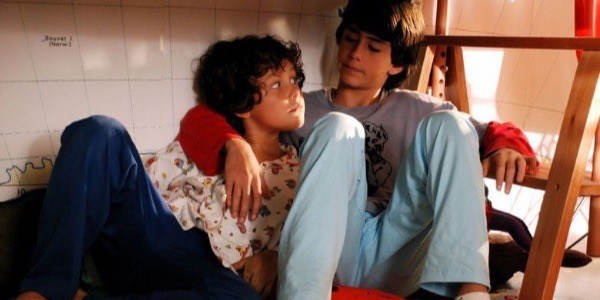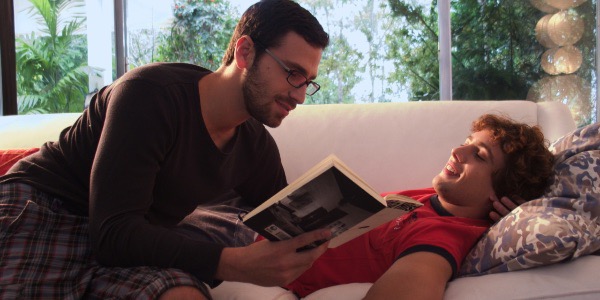Queerly Ever After #41: FROM BEGINNING TO END (2009)
Queerly Ever After is a bi-monthly column where I take a look at LGBT+ films that gave their characters a romantic happily-ever-after. There will be spoilers. Also, don’t forget to buy your Queerly Ever After merch right here.
I’ve been very conflicted about whether to even include From Beginning to End in this column, I ultimately decided to include it because it does appear in other searches for LGBTQ+ movies with happily ever afters. That being said, I do not actually consider this a happily ever after, the central couple of this movie should not be together, and I’m not even saying that because of the taboo nature of their relationship, though that is undoubtedly a factor. The movie, written and directed by Aluizio Abranches, centers on the romantic and sexual relationship between half-brothers Thomás (Rafael Cardoso) and Fransisco (João Gabriel Vasconcellos).
The movie is split into two parts, the first forty minutes of the film is dedicated to when Thomás and Fransisco are children (played by Gabriel Kaufmann and Lucas Cotrim respectively). They live in a huge beautiful home in Brazil with their doctor mother Julieta (Júlia Lemmertz), Thomás’ father and Julieta’s second husband, the architect Alexandre (Fábio Assunção), and Rosa (Louise Cardoso), who seems to be both Julieta’s best friend and also the boys’ nanny/housekeeper. The two brothers grow up very close. For some reason, the adults in their lives begin to believe that the boys are growing too close, and that their relationship may turn sexual. While yes, that does eventually happen, I have now forced myself to sit through this movie twice, the first time my SO watched it with me, and neither one of us saw anything untoward in the way the boys behaved towards each other as children. They just acted like brothers who were close.

The first part of the movie is better than the second because the second focuses on the brothers as adults after their mother has passed away. Honestly, they are not very interesting characters, and their relationship is not the fairytale that this filmmaker thinks it is. There actually could have been a really interesting movie in here, the one about Julieta and her incredibly close relationship with her ex-husband, Fransisco’s father Pedro (Jean Pierre Noher), and how she, Pedro, and Alexandre all get along so well. Oh, and also Rosa and Pedro sort of had a thing.

Anyway, after forty minutes of watching the two boys as children, and being told that their relationship seems maybe inappropriate (this should have been a case of show don’t tell, cause from what I saw, they never exhibited any odd behavior), we jump fifteen years into the future to the aftermath of Julieta’s death. It is then that the brothers’ relationship begins a new chapter.
What Would Freud Say?
When I was in high school, I was a bit of an arrogant kid, and I liked to see just how much I could get away with in regards to the essays I wrote. As it would turn out, I got away with quite a lot, and oftentimes turned in papers about how this or that character was stuck in one of the Freudian psychosexual stages of development. If I were still that kid, I would be writing about how Thomás and Fransisco aren’t actually in love but are trapped in the phallic stage because of an unresolved Oedipal complex that manifests itself after their mother’s death. Now, that is not what I am going to write, but it’s close. Thomás and Fransisco’s relationship doesn’t become physically intimate until right after their mother dies. Additionally, there is a scene when the two are frolicking in the ocean, and imagine that Julieta is there with them, playing along. It’s pretty apparent that their attraction to each other stems from some sort of misplaced sense of mourning for their mother.
Brotherly Love
Now, on to why, regardless of the incest angle, their relationship is an unhealthy one. Both men suffer from extreme jealousy. When Thomás makes a comment about other people being attractive, Fransisco becomes moody, when Fransisco goes out partying instead of video calling Thomás, Thomás becomes angered. The two of them have spent their entire lives together, and are incapable of spending time apart. Their “love” is more obsession than anything else. The number of times I wanted to scream at them to just go see a therapist while watching this movie was innumerable.

To throw in some conflict for the young brothers/lovers, Thomás, a swimmer, is invited to train for the Olympics. The only issue, he has to train in Russia for three years. As I mentioned, these two have never really spent any time apart which, I actually find really odd. These are upper-class young men from educated families, Fransisco becomes a doctor like his mother, am I supposed to believe they went to college together? Somehow they were together while Fransisco was in med school? Thomás is a competitive swimmer, I doubt they studied at the same universities. Anyway, Thomás going to Russia creates a big emotional dilemma for the two. This is then resolved when Fransisco goes to visit Thomás in Russia.
In Conclusion: From Beginning to End
In addition to portraying a romance that is toxic and obsessive, this movie is actually really boring. Clocking in at around an hour and forty minutes, there is not enough plot or conflict to drive it. I know I’ve said that a movie can just be a slow burn character study and not need large plots or conflicts, but Thomás and Fransisco do not make an interesting film. Give me the slow burn about Julieta and her lovers, now that’s a movie I’ll watch.
From Beginning to End was theatrically released in Brazil on November 27, 2009. For all other release dates, see here.
Watch From Beginning to End
Does content like this matter to you?
Become a Member and support film journalism. Unlock access to all of Film Inquiry`s great articles. Join a community of like-minded readers who are passionate about cinema – get access to our private members Network, give back to independent filmmakers, and more.
Join now!





